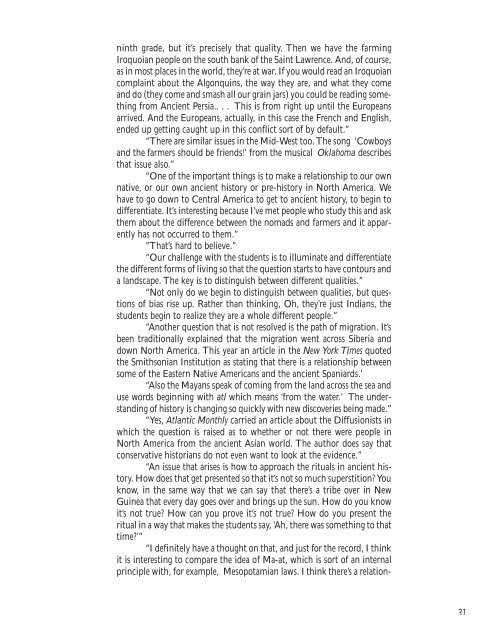Proceedings Colloquium on World History - Waldorf Research Institute
Proceedings Colloquium on World History - Waldorf Research Institute
Proceedings Colloquium on World History - Waldorf Research Institute
You also want an ePaper? Increase the reach of your titles
YUMPU automatically turns print PDFs into web optimized ePapers that Google loves.
ninth grade, but it’s precisely that quality. Then we have the farming<br />
Iroquoian people <strong>on</strong> the south bank of the Saint Lawrence. And, of course,<br />
as in most places in the world, they’re at war. If you would read an Iroquoian<br />
complaint about the Alg<strong>on</strong>quins, the way they are, and what they come<br />
and do (they come and smash all our grain jars) you could be reading something<br />
from Ancient Persia.. . . This is from right up until the Europeans<br />
arrived. And the Europeans, actually, in this case the French and English,<br />
ended up getting caught up in this c<strong>on</strong>flict sort of by default.”<br />
“There are similar issues in the Mid-West too. The s<strong>on</strong>g ‘Cowboys<br />
and the farmers should be friends!’ from the musical Oklahoma describes<br />
that issue also.”<br />
“One of the important things is to make a relati<strong>on</strong>ship to our own<br />
native, or our own ancient history or pre-history in North America. We<br />
have to go down to Central America to get to ancient history, to begin to<br />
differentiate. It’s interesting because I’ve met people who study this and ask<br />
them about the difference between the nomads and farmers and it apparently<br />
has not occurred to them.”<br />
“That’s hard to believe.”<br />
“Our challenge with the students is to illuminate and differentiate<br />
the different forms of living so that the questi<strong>on</strong> starts to have c<strong>on</strong>tours and<br />
a landscape. The key is to distinguish between different qualities.”<br />
“Not <strong>on</strong>ly do we begin to distinguish between qualities, but questi<strong>on</strong>s<br />
of bias rise up. Rather than thinking, Oh, they’re just Indians, the<br />
students begin to realize they are a whole different people.”<br />
“Another questi<strong>on</strong> that is not resolved is the path of migrati<strong>on</strong>. It’s<br />
been traditi<strong>on</strong>ally explained that the migrati<strong>on</strong> went across Siberia and<br />
down North America. This year an article in the New York Times quoted<br />
the Smiths<strong>on</strong>ian Instituti<strong>on</strong> as stating that there is a relati<strong>on</strong>ship between<br />
some of the Eastern Native Americans and the ancient Spaniards.’<br />
“Also the Mayans speak of coming from the land across the sea and<br />
use words beginning with atl which means ‘from the water.’ The understanding<br />
of history is changing so quickly with new discoveries being made.”<br />
“Yes, Atlantic M<strong>on</strong>thly carried an article about the Diffusi<strong>on</strong>ists in<br />
which the questi<strong>on</strong> is raised as to whether or not there were people in<br />
North America from the ancient Asian world. The author does say that<br />
c<strong>on</strong>servative historians do not even want to look at the evidence.”<br />
“An issue that arises is how to approach the rituals in ancient history.<br />
How does that get presented so that it’s not so much superstiti<strong>on</strong>? You<br />
know, in the same way that we can say that there’s a tribe over in New<br />
Guinea that every day goes over and brings up the sun. How do you know<br />
it’s not true? How can you prove it’s not true? How do you present the<br />
ritual in a way that makes the students say, ‘Ah, there was something to that<br />
time?’”<br />
“I definitely have a thought <strong>on</strong> that, and just for the record, I think<br />
it is interesting to compare the idea of Ma-at, which is sort of an internal<br />
principle with, for example, Mesopotamian laws. I think there’s a relati<strong>on</strong>-<br />
31
















